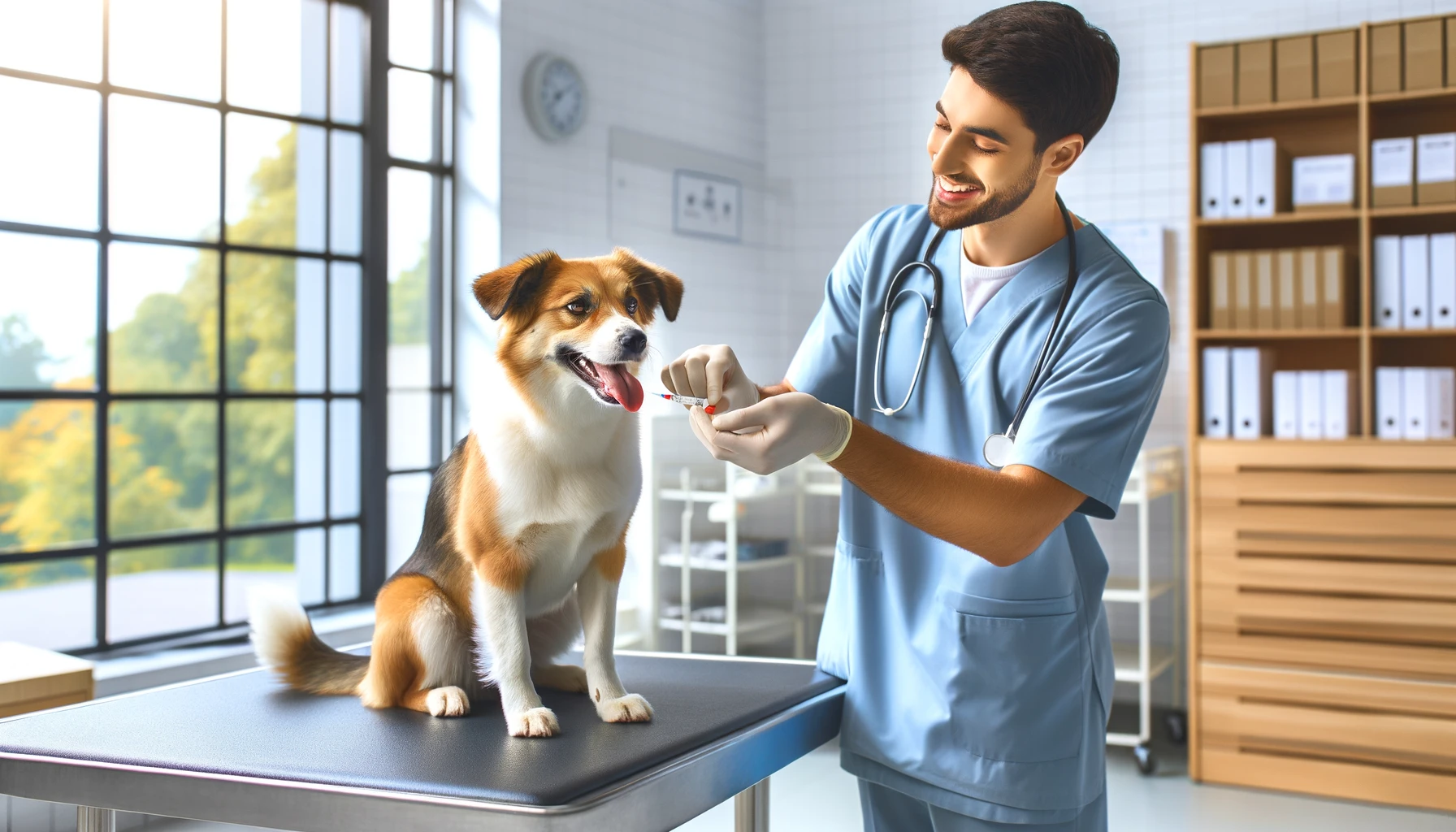Are you wondering, ‘Is my dog breathing fast?’ It’s a common concern among pet owners.
Fast breathing in dogs can be normal during exercise, as they need to circulate air efficiently and regulate their body temperature. However, if your furry friend is breathing rapidly while at rest or sleeping, it may indicate a problem.
Abnormal fast breathing could be a sign of respiratory distress or difficulty breathing. It’s crucial to pay attention to any other concerning symptoms your dog may be experiencing.
In such cases, it is recommended to contact a veterinarian to determine the cause and appropriate treatment for your dog’s fast breathing.
Key Takeaways
- Fast breathing in dogs can be caused by exercise, heat stroke, heart disease, anxiety or stress, and underlying medical conditions.
- Symptoms of fast breathing in dogs include reluctance to eat, drink, or move, unusual drooling, abnormally fast breathing compared to normal respiratory rate, using stomach muscles to assist with breathing, and pale or discolored gums.
- It is important to seek veterinary attention for fast breathing in dogs if there is excessive fast breathing, other concerning symptoms alongside fast breathing, and reluctance to eat, drink, or move, or if the gums are pale or discolored.
- Diagnosing the cause of fast breathing in dogs requires a comprehensive examination by a veterinarian, including a physical examination, X-rays, and additional diagnostic tests such as bloodwork or urine analysis. Treatment options depend on the underlying cause and may include pain relief medication, working with a dog behaviorist for stress or anxiety, providing a quiet and comfortable environment, and oxygen therapy for more serious cases.
Common Causes of Fast Breathing in Dogs
If your dog is breathing fast, there are several common causes that could be contributing to this rapid respiration.
One of the main reasons for fast breathing in dogs is exercise-induced rapid breathing. During exercise, dogs may breathe faster to efficiently circulate air through their bodies. This is normal and typically ranges from 100 to 350 breaths per minute.
However, if your dog is breathing abnormally fast outside of exercise, it could be a sign of underlying respiratory distress or difficulty breathing. In such cases, it’s important to seek immediate veterinary attention.
Another common cause of fast breathing in dogs is heat stroke. Dogs may pant excessively and breathe rapidly in hot weather, which can be life-threatening. If you suspect your dog is suffering from heat stroke, it’s crucial to seek immediate veterinary care.
Heart disease is another potential cause of fast breathing in dogs. Dogs with heart disease may breathe faster to compensate for insufficient oxygen distribution. Look out for additional symptoms such as coughing, exercise intolerance, and respiratory distress. If you notice any of these signs, it’s advisable to schedule a vet appointment to have your dog evaluated.
Lastly, anxiety or stress can also lead to rapid breathing in dogs. Behavioral training, environmental enrichment, and, in some cases, medications can help manage these underlying issues. If your dog is experiencing rapid breathing due to anxiety or stress, consult with your vet for appropriate advice and guidance.
Symptoms to Watch for With Fast Breathing
Watch for the following symptoms when your dog is breathing fast. If your dog is breathing abnormally fast, it may be a cause for concern. Fast breathing allows your dog to take in more oxygen and expel more carbon dioxide, helping to regulate their body temperature. However, if your dog is breathing at a rate significantly higher than their normal respiratory rate, it could be an indication of an underlying health problem.
Some symptoms to watch for include reluctance to eat, drink, or move, as well as unusual drooling. These signs may suggest that something is causing your dog’s fast breathing, and it’s important to address it promptly.
It’s important to note that this information doesn’t constitute medical advice regarding your dog’s health. If you’re concerned about your dog’s breathing, please make an appointment with your veterinarian. They’ll be able to assess your dog’s condition and provide the necessary guidance and treatment. Remember, your dog’s respiratory rate can vary based on their normal level of activity, so it’s essential to monitor any changes and seek professional help if needed.
When to Seek Veterinary Attention for Fast Breathing
If you notice excessive fast breathing in your dog, it’s crucial to promptly seek veterinary attention. Fast breathing in dogs can be a sign of a serious underlying condition that requires immediate medical intervention. While it’s important to note that not all instances of fast breathing are emergencies, it’s always better to err on the side of caution and consult a veterinarian.
There are certain situations where seeking veterinary attention for fast breathing in your dog is particularly relevant. If your dog is breathing fast but otherwise acting normal, it’s still important to contact a vet. Additionally, if your dog exhibits other concerning symptoms alongside the fast breathing, such as using stomach muscles to assist with breathing, reluctance to drink, eat, or move around, or if their gums appear pale, blue-tinged, or brick red, it’s crucial to seek veterinary attention immediately.
When you choose to seek veterinary attention for your dog’s fast breathing, the vet will conduct a comprehensive examination. This may involve diagnostic tests such as X-rays to assess the lungs and heart. The vet will also consider psychological factors and review your dog’s medical history to determine the underlying cause of the fast breathing.
Diagnosing the Cause of Fast Breathing in Dogs
To determine the cause of your dog’s fast breathing, the veterinarian will conduct a thorough examination and may perform diagnostic tests.
When you notice your dog breathing rapidly, it’s important to seek veterinary attention to identify the underlying cause. The vet will start by performing a physical examination, carefully assessing your dog’s overall health and looking for any signs of distress or discomfort. They’ll ask questions about your dog’s medical history, including any recent changes in behavior or exposure to potential triggers.
X-rays may be taken to check for issues in the heart, lungs, and abdomen. These images can also reveal signs of anxiety or stress that may be contributing to the fast breathing. Other diagnostic tests, such as bloodwork or urine analysis, may be recommended to further investigate any potential medical issues.
Treatment Options for Fast Breathing in Dogs
Begin treatment for your dog’s fast breathing by consulting with a veterinarian to determine the best course of action.
Fast breathing in dogs can be caused by various factors, such as pain, stress, anxiety, or underlying medical conditions. Your vet will conduct a thorough examination and may recommend further diagnostic tests to determine the underlying cause.
If pain is suspected, your vet may prescribe pain relief medication to alleviate discomfort and help your pooch breathe more comfortably.
In cases where stress or anxiety is the cause, working with a certified dog behaviorist may be necessary to address the underlying emotional issues contributing to fast breathing.
Regardless of the cause, it’s important to ensure that your dog has a quiet and comfortable environment, allowing water and heat to help regulate their body temperature.
Oxygen therapy will likely be recommended to support your dog’s breathing and promote healing. This may involve providing supplemental oxygen through a mask or nasal cannula to help your dog breathe more efficiently.
Rest is essential to allow your dog’s body to recover, and constant monitoring or hospitalization may be required for more serious cases.
Frequently Asked Questions
Why Is My Dog Breathing Fast While Resting?
If your dog is breathing fast while resting, it could be due to various reasons such as anxiety, pain, or respiratory issues. It’s important to monitor their breathing rate, keep them cool, and consult a vet if you’re concerned.
What Are the Signs of Respiratory Distress in a Dog?
Signs of respiratory distress in your dog include rapid panting, shallow breaths, wheezing sounds, flared nostrils, blue or pale gums, coughing or gagging, increased heart rate, restlessness or agitation, difficulty sleeping or lying down, and lethargy or weakness. Immediate vet attention is necessary.
What Does Labored Breathing Look Like in a Dog?
Labored breathing in dogs can manifest as rapid panting, shallow breaths, noisy breathing, flaring nostrils, gagging or coughing, blue or pale gums, lethargy, increased heart rate, difficulty breathing while lying down, and wheezing or whistling sounds.
Why Is My Dog Belly Breathing?
Your dog may be belly breathing for various reasons, such as anxiety, abdominal discomfort, or the risk of heatstroke. Exercise-induced panting, allergies, obesity, stress, medication side effects, heart disease, or coughing can also cause breathing difficulties.
Conclusion
If you notice your dog breathing fast while at rest or sleeping, it’s important to take it seriously. Fast breathing can be a sign of respiratory distress or difficulty breathing, which requires veterinary attention.
By seeking prompt medical assistance, you can ensure that your furry friend receives the appropriate treatment and care they need. Remember, a quick response can make a world of difference in your dog’s health and well-being.






